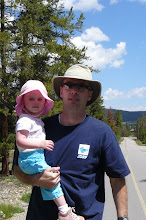Who do you say we are?
Wednesday, June 06, 2007 by niebuhrian
Seriously, who are we? What are we? How did we come to be in this place at this moment in time? I know you can probably ask, and answer, this for yourself. However, think a bit bigger if you will. I am asking about your anthropology.
I know, fairly big word, first post in almost six months, plus I doubt many will read this post anyway (and of those that do, even fewer will respond); yet, doesn’t all theology, to some extent, begin with anthropology? Our experiences of the world, of people, of ourselves provide us with qualities we often ascribe to God.
Yes, we can certainly hope the God we believe in is more than the projections of mere mortals. In fact, that may be our greatest hope, that God is something infinitely more complete than our brains, our experiences, and even our hopes might concoct.
Yet, even these enduring qualities only make sense through our experiences in life. It is said that God is love, but what is love apart from the experiences of the emotion we have had, or apart from the relationships that sparked such emotions? Is the Love/God the entity of Falwellian preaching? Does this enduring/infinite love have limitations as that former preacher might endeavor to assume? Is the Love/God the entity of a schoolboy/schoolgirl crush? How even could we assume to know what love is in order to posit it to the Other?
We see dim reflections in mirrors (according to Paul at least) and in those reflections I would say we assume to know who or what God might be. We posit absolutes where the reflections are nothing more than smudged and fuzzy pictures of reality. In the end, we proclaim who God is without fully understanding or even taking responsibility for what it is we are claiming.
So, then, who do you say we are? Because who you say we are reveals who you say God is as well. After all, those dim reflections are nothing more than smudged self-portraits of often scared and lonely (joyful and hopeful as well) people. Anthropology has much to say about theology and vice versa.
As for me, at this moment in time, my hope lies in two places. First, my hope lies with that smudged self-portrait, in that fuzzy Imago Dei.Second, my hope lies with the realization that without a brighter object than myself, there would be nothing to reflect in the first place.
Grace and Peace…
I know, fairly big word, first post in almost six months, plus I doubt many will read this post anyway (and of those that do, even fewer will respond); yet, doesn’t all theology, to some extent, begin with anthropology? Our experiences of the world, of people, of ourselves provide us with qualities we often ascribe to God.
Yes, we can certainly hope the God we believe in is more than the projections of mere mortals. In fact, that may be our greatest hope, that God is something infinitely more complete than our brains, our experiences, and even our hopes might concoct.
Yet, even these enduring qualities only make sense through our experiences in life. It is said that God is love, but what is love apart from the experiences of the emotion we have had, or apart from the relationships that sparked such emotions? Is the Love/God the entity of Falwellian preaching? Does this enduring/infinite love have limitations as that former preacher might endeavor to assume? Is the Love/God the entity of a schoolboy/schoolgirl crush? How even could we assume to know what love is in order to posit it to the Other?
We see dim reflections in mirrors (according to Paul at least) and in those reflections I would say we assume to know who or what God might be. We posit absolutes where the reflections are nothing more than smudged and fuzzy pictures of reality. In the end, we proclaim who God is without fully understanding or even taking responsibility for what it is we are claiming.
So, then, who do you say we are? Because who you say we are reveals who you say God is as well. After all, those dim reflections are nothing more than smudged self-portraits of often scared and lonely (joyful and hopeful as well) people. Anthropology has much to say about theology and vice versa.
As for me, at this moment in time, my hope lies in two places. First, my hope lies with that smudged self-portrait, in that fuzzy Imago Dei.Second, my hope lies with the realization that without a brighter object than myself, there would be nothing to reflect in the first place.
Grace and Peace…
